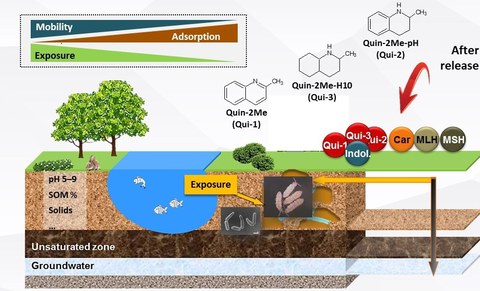Flüssige Wasserstoffträger
Flüssige Wasserstoffträger (Liquid Organic Hydrogen Carriers; LOHCs) sind eine mögliche Alternative, regenerative Energie aus zum Beispiel Wind- und Sonnenkraft in Form von Wasserstoff sicher und langzeitstabil zu speichern. Dabei wird Wasserstoff durch Hydrierung ungesättigter Bindungen am Trägermaterial chemisch gebunden. Die Forschung in diesem Gebiet hat in den letzten Jahren zu ersten Anwendungen im Pilotmaßstab geführt. Zahlreiche unterschiedliche Chemikalien können hierbei Verwendung finden. In Zusammenarbeit mit dem Bavarian Hydrogen Center (BHC) und der Arbeitsgruppe von Prof. Dr. Peter Wasserscheid suchen wir nach Strukturen, die neben einem optimalen technischen Leistungsprofil auch ein möglichst geringes Gefährdungspotenzial für Mensch und Umwelt aufweisen. Hierzu untersuchen wir u.a. (öko-)toxikologische Wirkprofile und die biologische Abbaubarkeit unter verschiedenen Umweltbedingungen. Für die Abschätzung der Gefährdungspotenziale werden neben den verwendeten Reinstoffen auch komplexe Stoffgemische berücksichtigt, die bei technischen Prozessen entstehen.
Sie möchten mehr zur Funktionsweise von LOHC erfahren, und erste umweltrelevante Forschungsergebnisse interessieren Sie?
Bitte lesen Sie mehr dazu in
Markiewicz M., Zhang Y.-Q., Empl M., Lykaki M., Thöming J., Steinberg P. and Stolte S. (2018) Hazard assessment of quinaldine-, alkylcarbazole-, benzene- and toluene-based liquid organic hydrogen carrier (LOHCs) systems. Accepted for publication in Energy & Environmental Science. DOI: 10.1039/C8EE01696H
Markiewicz M., Zhang Y.Q., Bösmann A., Brückner N., Thöming J., Wasserscheid P., Stolte S. (2015) Environmental and Health Impact Assessment of Liquid Organic Hydrogen Carrier (LOHC) systems - Challenges and Preliminary Results. Energy & Environmental Science 8, 1035-1045. Open Access
Zhang Y.-Q., Markiewicz M., Filser J., Stolte S. (2018) Toxicity of a Quinaldine-Based Liquid Organic Hydrogen Carrier (LOHC) System toward Soil Organisms Arthrobacter globiformis and Folsomia candida. Environmental Science & Technology, 52 (1), 258-265.
contact: Dr. Marta Markiewicz
Dr. Ya-Qi Zhang

